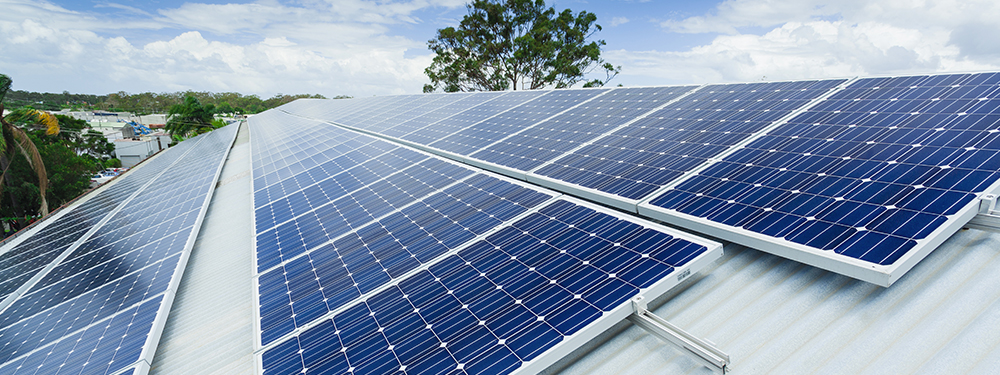The solar energy industry has experienced tremendous growth in the past few years. The National Solar Job Census estimated that nearly 250,000 people were employed in the industry in 2019, and this number is expected to double in the next five years.
The construction industry has an opportunity to benefit from this solar boom. As the market grows, new opportunities and benefits of solar energy for construction companies have emerged. Specifically, builders can benefit by providing solar panels for business and residential customers.
The price to install solar technology is becoming cheaper as the cost of panels declines. As states require solar systems on new builds, there is more installation work to be completed. Construction companies equipped to perform solar installations must fulfill this demand.
By 2024, the U.S. Bureau of Labor Statistics estimates that the construction industry will add more than 800,000 jobs to the market. Many of the highest-paying jobs are for those experienced in solar technology. There are many benefits for builders who incorporate solar technology into their projects.
Solar Panel Building Codes
The solar panel installation process is complex, as fire and electrical city codes pertain to these systems. Because solar panels are a new technology, city codes may need to be modified to ensure people remain safe. Codes are significant for workers who install solar panels because of the following issues:
- Restrictive language limits how solar panels can be installed.
- New solar technology is incompatible with outdated building codes.
- Codes often vary between states, counties and cities.
- Policies can be inconsistent or inappropriate.
Building codes that impact solar panel installation processes are adopted at the local level in most cities. State-level regulations can provide more consistency, but many states leave it up to individual jurisdictions to make their own decisions. On the other hand, state-level codes can make it hard for contractors to have the authority to adopt their building processes.
Builders should familiarize themselves with the building and electrical codes in all areas in which they operate. Management should educate workers and homeowners on local and states regulations and plan installation processes accordingly.
6 Benefits of Solar Technology for Builders
While there may be an initial cost to integrate solar technology into your building projects, the long-term investment is significant. Builders should make long-term financial projections and consider their revenue estimations in a year or two.
Here are 6 ways that solar can benefit builders, consumers, communities and the world at large.
1. Sustainable Building Practices
The U.S. building construction industry plays a significant role in the country’s energy consumption problem. The U.S. Department of Energy estimates that the U.S. construction market is responsible for approximately 40% of the nation’s energy usage. Adopting green practices such as solar panel technology can make a significant impact. As energy needs continue to grow across the country, renewable energy sources are more critical than ever. Thus, more solar energy jobs are added to the market, strengthening the economy.
Companies can do more beyond integrating solar technology into their building processes. Adopting green building techniques such as using fewer non-renewable energy sources can make a big difference. Using renewable sources to operate machinery and tools can help builders save money and reduce carbon outputs. Adopting sustainable building practices can also help increase the longevity of your company and improve your bottom line.
2. Financial Incentives
Solar technology offers financial incentives from state and federal agencies. Keep in mind these economic benefits are reserved for the individual who owns the solar equipment. If homeowners lease the equipment from the builder, they are not entitled to these benefits. Instead, the builders who lease the equipment are eligible for these financial incentives. In fact, homebuilders can improve their bottom line by leasing solar equipment to customers. The following financial incentives are available to the individual who owns solar panels:
- Solar energy credits: Renewable energy credits can help solar owners earn a return on their investment. Some states allow builders to capture a portion of this credit, while others give the entire credit to the solar owner. Homeowners can even sell their credits through third-party financial companies, which bundle and sell credits to the local utility company.
- Excess energy: Solar panels do not quit producing energy when your consumption stops. If your system has too much power, it is sent back to the local grid and the local utility company must compensate you for the watts. Some people sell their solar energy and use this money to pay their monthly electrical bills. Consumers can even store this excess energy and use it on days their system does not produce as much energy.
- Federal Investment Tax Credit: This is available to any company or homeowner who purchased a solar system in 2020. The tax credit is significant and can pay for a substantial portion of the system. For example, you can receive a $6,000 tax credit to purchase an $18,000 solar panel system. This credit is expected to be phased out over the next few years, so take advantage of this financial incentive while you can.
- Cash rebates: Certain states offer tax rebates to builders or homeowners who purchase solar panel systems. The tax rebate amount varies from state to state, but this financial incentive coupled with federal incentives can offset a large portion of the system price. Builders can visit the State Database for Renewables and Efficiency website to find economic benefits located in their local area.
- Performance based-rebates: Some state utility companies offer performance-based financial incentives to solar panel owners. These incentives pay you a certain number of credits based on the number of watts your system produces. The utility may pay you a cash amount equal to the number of credits earned over a set period of time.
- Tax exemptions: Your state government may reduce your state tax liability if you have a solar system. Solar panels typically increase the value of a property by up to $20,000. You may get property or sales tax exemptions based on the system’s retail amount and the value it owns to your property. Check with your local government as different states have varying tax rules.
This is not a comprehensive list of the financial benefits of owning a solar panel. Most people see a significant decrease in their monthly utility bills after the installation of solar energy. These savings can pay for the cost of the system in a matter of years.

3. Strengthen the Local Economy
Solar panels can help strengthen the local economy. Individuals waste a tremendous amount of money on traditional energy sources. However, renewable energy is cheaper and better for the local economy.
For example, solar farms can gather power and plug that energy back into the local grid for wide-scale consumption. Furthermore, solar technology creates jobs for construction installers, manufactures, designers, and repair personnel. These jobs are technical and often pay a high hourly wage, allowing people to provide for their families.
Although the costs associated with the initial solar installation can be hefty, the long-term benefits are significant. The tax credits, rebates, and utility bill savings make solar panels a great alternative to traditional energy sources.
4. Help the Environment
Solar panels generate a form of energy that is better for the environment than traditional energy sources. Alternative energy sources benefit the environment on a local, national and global level. Solar energy can help families and communities reduce high carbon footprints.
Most energy sources in the U.S. are generated from traditional sources such as natural gas and coal. These energy sources are expensive and unsustainable and can hurt the environment. On the other hand, solar energy is free, renewable, and abundant. It does not harm the environment and is an excellent alternative to traditional fossil fuels. By investing in solar energy, builders and homeowners are relying on the sun’s energy, one of the most consistent elements on earth.
As well, fossil fuels require massive amounts of water to produce and can contaminate local water sources. Solar energy does not pollute any natural resource and does not require any water. Our earth’s water supply is limited, and investing in solar energy can help protect this vital resource.
5. Attract New Customers
Many customers, particularly younger consumers, are motivated by personal values. These consumers value being environmentally friendly and are often willing to pay a premium to do their part to reduce harmful emissions.
Solar energy is the preferred energy source of many young homebuyers. These buyers are looking for ways to help the environment and are often willing to pay a high price for a home equipped with solar panels. Many buyers do not want to install the panels themselves, but they are willing to pay for a home that is already equipped with this feature.
Incorporating solar panels into your new builds may attract new customers, many of whom are happy to pay higher prices for convenience and green energy options. Offering solar technology can improve your chances of attracting new customers and cashing in on this new trend.
6. Comply With New Building Regulations
California recently enacted a law that requires all homes and buildings to have solar panels. This legislation is good for the environment, but it will take time for builders to integrate solar technology into their established building processes. More states, including Nevada and New Mexico, are expected to adopt similar laws in the coming years.
Integrating solar panels into your building’s process now can help builders stay ahead of the curve. Doing the work upfront to redesign your building plans can save you time, energy, and heartache down the line. Adopt solar technology now and be prepared when new building regulations are adopted in your local area.
The Future of the Solar Market
The popularity of solar energy is only expected to increase in the years to come. Although some political administrations do not promote solar energy, this alternative form of energy is not going anywhere. Many political officials, construction companies, and corporations are pushing for more people to adopt solar energy now and in the future.
Construction companies that do not embrace solar energy may be left behind. Installing more solar panels benefits the homeowner, the builder, the local economy, and the environment. The solar industry creates more jobs and produces financial incentives for households. Renewable energy is an important topic and builders can benefit by embracing this technology and making it available to more consumers.
Take Advantage of the Benefits of Solar Energy
Solar technology has become increasingly popular in recent years. Many potential buyers will not buy a home without solar-ready features or a complete solar installation. Further, many U.S. states are considering adopting mandates soon to require solar panels on all new homes. California mandated solar technology on all new construction projects in 2020.
To take advantage of the benefits of solar energy, homebuilders should embrace this technology. Integrating solar panels into your established building processes and offering this feature to all home buyers can help grow your business, whether or not your local area yet mandates it.
While it may take some extra energy and money to add this technology to your current and future construction projects, it will pay off in the end. Don’t wait any longer to learn more about solar power. Contact Unbound Solar® now to find a solar solution for your business and clients.



